Skin changes during pregnancy
Yourself

When you are pregnant, you may experience some changes in your skin, such as a sudden glow on your face or dark patches in your face.
Pregnancy Glow
Your body produces 50% more blood when you are pregnant, resulting in more blood circulation through your body. Your skin retains more moisture, which smoothes out any fine lines and wrinkles and makes your face brighter. On the other hand, this may make you look puffy from water retention.
What can I do?
You can use an oil-free cleanser to clean your face if it becomes too oily. Remember to drink plenty of water to stay well hydrated, which can actually help to alleviate water retention.
Why is my skin darker than usual?
Developing spots of darker skin is pretty common when you’re pregnant. The condition is called melasma or chloasma. These dark spots can appear on your cheeks, jawline, forearms, and other parts of your body that are exposed to the sun. Skin that’s already more pigmented – such as your nipples, freckles, scars, and the skin of your genitals – may become even darker during pregnancy. This also tends to happen in areas where friction is common, such as your underarms and inner thighs. After delivery, these areas will lighten again with time. However, your nipples may remain slightly darker than they were before.
What can I do?
There is nothing much you can do, but to wait until your skin returns to be normal after giving birth. Skin whitening treatments are usually not recommended during pregnancy. If you spend time outside in the sun, protect your extra sensitive skin with a good sunscreen (SPF 15 or higher) and wear a hat.
Acne and Spots
The extra hormones in your body make your oil glands to secrete more oil, which can block the ducts and irritate skin. If you already have a problem with acne your acne may become worse during pregnancy.
What can I do?
To prevent breakouts, cleanse no more than twice a day with a mild soap, a gentle cleanser, and water. If your skin is dry, use a fragrance-free, water-based emollient, and an oil-free moisturizer. Some acne treatments shouldn’t be used during pregnancy, so don’t use them unless your doctor advises you to. Most likely, your skin would return to its pre-pregnancy condition a few weeks after your baby is born.
Here three all-natural remedies for treating pregnancy acne:
- Citrus fruit contains alpha hydroxy acid, which helps unclog pores and shed dead skin cells. Squeeze the juice from a lemon and apply it to spots with a cotton ball. Leave on for 10 minutes and then rinse with water.
- Honey has antibacterial and antiseptic properties. It’s also soothing to the skin. First rinse your face with warm water and then apply honey and leave it on your skin for 20 to 30 minutes. Rinse with warm water.
- Coconut oil has antibacterial and antifungal properties. You can apply it instead of a moisturizer before going to sleep.
Verified:
Dr. Wanwadee Sapmee Panyakat (OB-GYN), license no. 41208 (31 January 2019)



